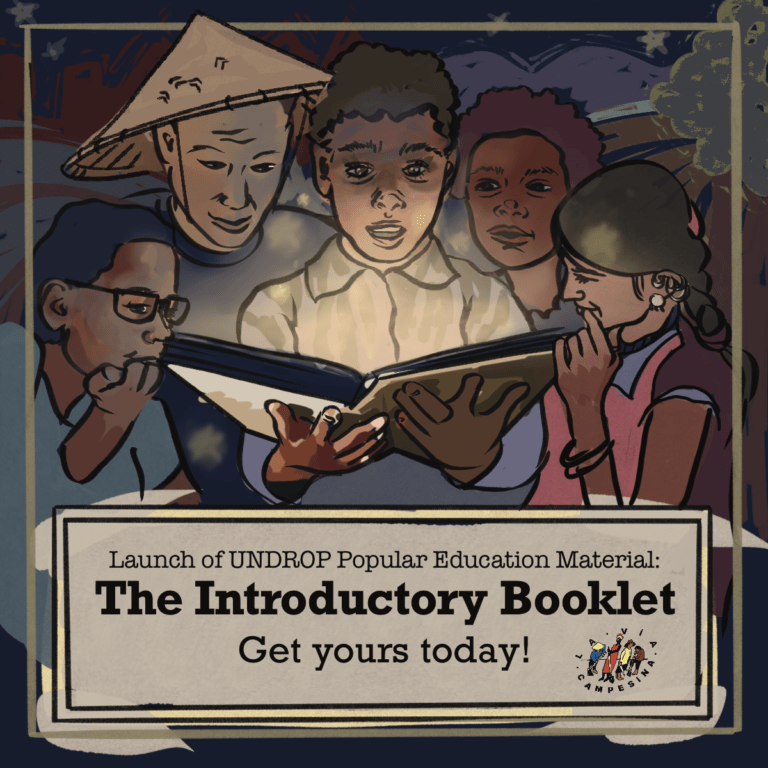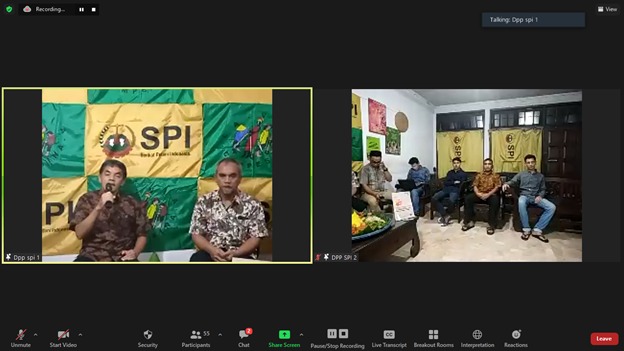On December 17, 2021 the Indonesian Peasants’ Union (SPI) celebrated the three years since the United Nations Declaration on the Rights of Peasant and Other People Working in Rural Areas (UNDROP) was adopted in 2018 by the UN General Assembly.
On that day, as part of the celebrations, SPI organize many activities in Indonesia. An international webinar was one of the activities. The webinar was attended by many participants including from Africa, Asia, Latin America and Europe.
In his opening remarks, Henry Saragih, the former General Coordinator of La Via Campesina and the Current Chairman of SPI said that the approval of UNDROP was the result of 17 years of joint and long work not only by the farmers but various actors including legal experts, academic institutions, and civil society organisations.
He likened the UNDROP to a river that comes and derives its current from and is sustained by many springs and tributaries.
Indeed, UNDROP is a collective outcome of many efforts and actors. Many countries from Asia, Africa, Latin America and Europe supported the process, without them, success was not possible. For instance, in Geneva, various countries from the Non-Aligned Movement and the Asian-African Conference were instrumental in transforming the struggle for peasant’s rights into reality and set the process into motion in the United Nations Human Rights Council (UN HRC).
“Many said that this declaration (process) is difficult because it takes a lot of time, a lot of human resources. The food crisis in late 2000s, however, gave the process enough impetus as it sparked great awareness about the fragility of the global food system and the need to protect peasant farmers and people working in rural areas,” he explained.
The doubters were right because peasants lacked the requisite key resources to start and sustain a “difficult process” for the recognition of their rights in the formal corridors of international multilateral institutions such as the UN. However, the peasants had and still have “lots of time and patience” and the critical masses encapsulated in the form of global solidarity and unity. This has been demonstrated countless times in past peasant struggles. More recently, the Indian farmers’ protest against their government to repeal the three agricultural laws which ended with victory end of 2021 is a clear testimony to this. In response to a journalist’s query about the perseverance displayed by India’s farmers even after several rounds of failed negotiations with the Government of India, Rakesh Tikait of Bhartiya Kisan Union evoked the everyday struggle of a peasant in the field, he said:
“Resilience is in our blood. Every year after sowing seeds, we wait patiently for months on end to reap the harvest. It is back-breaking work in difficult conditions. Often, a drought or an untimely hailstorm wreaks it all and smashes all our hopes for a better yield and income. Yet, we persist. We do not give up. We do not run away. Come winter, and we plant again. In one village of Rajasthan, my people have waited 12 long years for rains. Farmers are the epitome of patience. Our farm is our life. If we can wait for rain for 12 years, what are these three farm laws? We will wait, but we will not accept defeat.”
The victory of 2018 when UNDROP was formally adopted by the UN General Assembly is, for the peasants, only half the battle won. What is more important now is for the declaration to be implemented. The latter stage of implementation faces many obstacles.
According to Zainal Arifin Fuad, a member of the International Coordination Committee (ICC) of La Via Campesina, more work needs to be done to fight at the United Nations to implement special procedures, so that UNDROP is applied and mainstreamed into every UN system.
He also stressed that besides pushing for mainstreaming at UN level, social movements and civil society organization should as a matter of urgency work more at the grassroots to educate and increase the understanding of the declaration by the right holders so that UNDROP becomes alive and fulfills the rights of all people.
Henry Saragih and many other participants who attended the webinar support this point too that UNDROP implementation is important and requires a lot of effort to create wider awareness.
Saragih acknowledged the huge task that lies ahead and the need to be ready. He said “this struggle of ours requires a lot of strength and wide reach. We must not let our lives, our food, be handed over and taken care of by people who have no right. Therefore, farmers must be ready wherever the terrain is, starting from agricultural land to negotiating tables.”
Budi Laksana, Secretary General of the Indonesian Fishermen’s Union (SNI) said that “it’s not enough just to socialize (UNDROP) from books and brochures only. This must be a tool for constitutional struggle, so that it becomes an encouragement for all people’s movements in fighting for their rights.”
“We have a big job to make UNDROP happen. Work in agrarian reform, in the right to seed, and other ideals. … what is no less important is how to inflame this struggle not only at the international level, but also at the local and national level,” said Henry Simarmata – a legal expert.
Morgan Ody of Confederence Paysanne (a farmer’s organization from France) and the new General Coordinator of La Via Campesina also participated in the webinar. She said that farmers’ rights have become increasingly challenged in recent times on many fronts and making it difficult for peasants to prosper. “Currently we have great work to do to make UNDROP accepted by the public. This includes making steps so that each of our members at various levels respects this right. This is not an easy thing considering that large-scale corporations and transnational corporations have interests that are opposite to ours,” she added.
Nury Martinez of Federación Nacional Sindical Unitaria Agropecuaria (FENSUAGRO) in Colombia and an ICC member of LVC also highlighted that more work needs to be done to make UNDROP a reality in the everyday lives of the peasants.
Anuka De Silva, a youth farmer of MONLAR from Sri Lanka and youth ICC member said that UNDROP brings a great opportunity on how to talk about the rights of peasants and people who work in rural areas, talk about human rights, talk about farmers. And that we have a great opportunity to fight neoliberalism and transnational corporations that violate peasants’ rights.
“We saw what happened during the pandemic, the big companies were trying to destroy our way of farming… this is why UNDROP is important as an instrument of struggle, to deal with these actors” stressing the importance of UNDROP as a tool for our struggles.
Elizabeth Mpofu of Zimbabwe Small Holder Farmers’ Forum (ZIMSOFF) from Zimbabwe said that all elements of the peasant movement in the world should strive to implement this declaration even though we have many obstacles starting from the WTO and others.
She said that ZIMSOFF will continue to support efforts to implement UNDROP in Zimbabwe.
David Otieno of Kenya Peasant League also said that although UNDROP is still relatively unknown in Kenya, they have used the declaration as a basis and an instrument to support local struggles.
“We did an analysis that there is currently an extinction in our local seed. Therefore, it is important to immediately apply at the national level, to protect these rights. We can protect many things, if farmers understand their rights (enshrined in UNDROP). We must fight together, collectively, for the common good,” he said.
Helio Dias Da Silva from MOKATIL (a farmer organization from Timor Leste) said that his organisation had taken an approach so that UNDROP could be applied by their government.
“Given the dynamic national political situation, we are taking constitutional means so that this can be incorporated into domestic policy. We are also making big changes by incorporating food sovereignty into public policy. We intervene so that we can make changes at the production level, up to the distribution,” said Helio.
Kim Jeon Sool from the Korean Women Peasant Association (KWPA), South Korea said that her organization is currently conducting activities to distribute seeds to the surrounding community, as part of their campaign strategy to push UNDROP (awareness) to the general public.
Shalmali Gutal from Focus on Global South highlighted that UNDROP is an important victory to overcome hunger, exploitation and abuses of farmers and other people working in rural areas.
She said “UNDROP is a huge victory for the struggle for food sovereignty, agroecology, for human rights, for justice and for life without exploitation and for being able to protect also the rights of nature. Shalmali committed that her organisation will join all the efforts to make UNDROP implementation a success.
On how the UNDROP can have an impact on the grassroots, Raffaele Morgantini of CETIM, Switzerland believes that collective actions are important to bring about change, and these should be done at various levels and be made more effective. He said “… today if respected and effectively implemented, this instrument [UNDROP] would be useful not only for peasants but humanity as a whole, as a common roadmap, as a kind of a new social contract towards more equal and just societies.”
This is important to be able to build food sovereignty in each country, ensure agrarian reform, and control of the means of production for peasants and people working in rural areas. However, the ongoing COVID-19 pandemic continues to affect and hinder the full scale ways and means to implement UNDROP. There is therefore a need to adapt the peasant movement’s implementation plans to the current global health context and take advantage of the existing opportunities to popularize UNDROP and create wider awareness.
“… We must continue to proclaim the (UNDROP) struggle and move it together. Because those who are anti-peasants’ rights also keep moving. In Indonesia, we saw the birth of the Job Creation Law, although in the end we succeeded in having a judicial review and making it conditionally unconstitutional,” Henry Saragih concluded.

On the eve of the third anniversary of the formal adoption of the UN Declaration on Rights of Peasants and Other People Working in Rural Areas (UNDROP), La Via Campesina and FIAN International launched the first booklet in a five-part toolkit of popular education materials. The purpose of this toolkit is to create broader awareness, promote deeper understanding and enhance capacities (through training) of rural people’s movements. La Via Campesina encourages its members and allies to use this booklet as a foundational tool to ensure that the UNDROP will be respected, implemented and promoted at all levels, from local to international, from community customs to policymaking mechanisms.
The implementation phase indeed requires the resilience, perseverance [and patience], and the solidarity and unity that the peasants have developed in the fields and in many other past struggles. This time, the peasants and other people working in the rural areas, have another tool at their disposal- a stronger and diversity global network to support the process. The current worsening multiple (climate, economic, health, socio-political etc) crisis facing humanity and the urgency for sustainable solutions is fertile ground for radical social transformation to better societies based on justice, equality, respect, and solidarity. For the millions of peasants, small and medium-size farmers, women farmers, landless people, indigenous people, migrants and agricultural workers and youth from around the world seeking to defend small-scale sustainable agriculture as a way to promote social justice and dignity, the recognition and enforcement of UNDROP is a crucial step in the right direction to such better societies.
This post is also available in Français.

